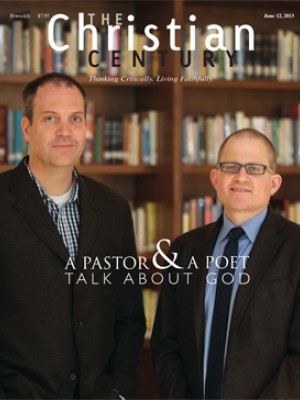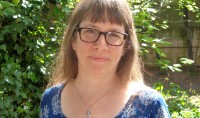Song for a time of terror

When the bombs exploded at the finish line of the Boston Marathon, I was a few miles away, sitting around a table with colleagues from near and far, discussing the Song of Songs. We were a small group of scholars from a wide range of disciplinary perspectives, but we all love the Song, even though we read it in very different ways. What I loved about this gathering is that when a presenter at one end of the table would start quoting from the Song, a murmur would rise up around the table as others joined in. The Song of Songs was pressed into each person’s memory, written on each heart through long study. That morning, one participant commented joyfully, “Everyone here loves the Song as much as I do!”
By the time we broke for coffee, the bombs had exploded. The heroes had already run toward the blasts, torn off their clothes and tied them around the wounded bodies of strangers. Lives had already been irrevocably changed.
Word of the attack spread quickly. The host of the conference had a nephew running in the race; his family was there cheering him on. We found out that the nephew and family were safe. We passed this good news around, along with rumors that later turned out to be false: that the bombs had been in trashcans and that the police had dismantled two others. Some rumors turned out to be true: many people were badly hurt; legs had been shattered; people had died.
Read our latest issue or browse back issues.
We had half an hour before beginning a panel discussion open to the public. We wondered if we should cancel it. But people had already assembled, and we decided to go ahead. The host welcomed everyone and made it clear that we should feel free to keep checking the news and to come and go as needed. He also reminded us that careful study of this sacred text was an affirmation of the profound worth of human life. The Song’s vision of two lovers at home in the world is worth remembering, studying and cherishing—a good response, he suggested, to the terror of the day.
Each panelist examined the Song in a distinctive light, whether of literary criticism, Jewish philosophical theology, Christian allegory or pastoral practice. Members of the audience pushed the conversation forward, asking questions, contributing their own knowledge. Listening to discussion of the Song’s great themes—mutuality in love, the goodness of the body, the responsiveness of creation, the pleasure and pain of desire—I thought: this is the opposite of setting off a bomb in a crowd of people. Such an act of violence is indiscriminate; it betrays no interest in the lives of those in harm’s way; it reflects an unwillingness to imagine, as Virginia Woolf once put it, the “infinite possibilities . . . furled” within each life.
In sharp contrast, the Song of Songs is a poem about cherishing everything that makes another human being distinctive—not only what can be seen and admired but also what remains mysterious and hidden. Although the lovers in the Song know each other intimately, their dialogues are punctuated by questions that reveal that they are as attentive to what they can’t know of each other as they are to what they can. Where are you, the woman asks. Why can’t I find you? And the man, overwhelmed in her presence, asks: Who are you? Even though they know each other deeply, they also know that each contains “infinite possibilities . . . furled,” possibilities as worthy of reverence as the physical beauty each admires in the other.
On the day of the bombing it was impossible to imagine that four days later 9,000 armed officers would be searching for one teenage boy or that the accused bombers would turn out to be neighbors, graduates of a local high school, friends of people we know. What possibilities had lain furled within these two brothers, and why did this one take precedence over all the rest? What had dulled their imagination about the possibilities hidden within each person waiting at the finish line? How could our community have helped to encourage the alternatives?
When I remember the bombings, I hope I will recall, alongside the terrible losses and the heroic actions, the quiet work of love I was privileged to witness that day: a group of human beings holding in their collective hands a poem rendered sacred by centuries of study and debate, prayer and argument, hope and longing. I hope I will remember the close, careful attention of those readers who cherished not only what was shining on the surface of the Song but also what was hidden from our eyes. And I hope I remember to pass on to my students not only the skills they need to do such work but the conviction that reverent attention to all that is furled within a text, within the world, within the life of another human being is holy, life-saving work.







